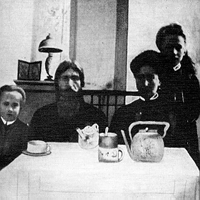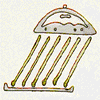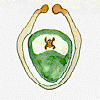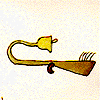Andrej Blatnik
The Drummer's Strike
As the stick approaches the drumhead, everything seems to be lost; look, the saxophone player inhales too early and he's going to blow at the wrong time, the man on the bass acts as though the instrument in his hands has suddenly turned into a dried stick, the trumpet player's eyes are bulging and he's thinking about the red sports car that almost ran him over when he was three years old and had suddenly broken free from his mother and dashed out onto the road, the pianist glances from one end of the keyboard to the other, it seems as if the keys have somehow curved, bent inwards, as though the devil had ignited a fire under them, and the singer is also losing control, her garter is slipping, she knows she can only groan inaudibly into the microphone, that is, if she could reach it, because it looks like it will topple any second now, people will drop cutlery onto unfinished meals any time now and desperately start searching for the waiter, the maitre d' will hold his head in despair, true, the man in the reception will shrewdly shake his head at the disaster, no, I'm afraid we're all sold out for tonight, but everything is in vain, a good business will go belly up; luckily, the drummer slows down his strike in the nick of time, the stick gently comes to rest on the vellum, and they all start playing right, and the singer caresses the microphone and sings as sweetly as a lark, all is won, the guests clatter their cutlery contentedly, could you save us a table for tomorrow as well, please, they whisper to the maitre d', this music is so nice, we'll come, we'll come again.
Translated by Tamara Soban
Jessica Treat
His Sweater
I found his sweater on a rack in a store yesterday--I mean, it wasn't his but it was the same sweater, the one I used to wear when he forgot it in my room and I'd put it on and smell his cologne and his baby skin, his thin shoulders, his boy's body. Of course I bought it, even though I haven't got much money_I mean I haven't worked for over 3 weeks now--I tried it on in the store and it was too big for me so I bought it because that's how he wore it--with the sleeves rolled up at the wrists. Anyway, it was a discount store so the sweater was half-price. One of them was hanging above the rack for everyone to see--I wanted to take it down, to hide the rest because it seemed like mockery, the store having so many of them, his gray and yellow sweater specked with blue. If only I had more money, I'd buy the rest of them, buy all of them, but no, I wouldn't either_they'd stare at me from the closet, or wherever I put them; there should only be one.
I'm wearing it now. It comes down past my waist and I let the sleeves dangle over my hands when I walk. It's my secret. No one knows why I wear it every day or anything about it; no one knows him here. I left him. I moved. It's winter and it's cold and I don't have a job, I'm still looking, but I've got his sweater on, nothing could keep me warmer.
My roommate, for instance, doesn't know much about me. But she knows I don't have a job. Of course when I moved in I told her I had one--I had to. Anyway I had money then. I don't anymore. I'm down to my last twenty that is. But there's still food in the cupboard. Most of it's hers, but some of it's my own. The can of chick peas and tomato soup for instance. She asks how the job hunting is going. I don't let on that it's going very slowly. Today I saw a hand-written sign in a dark window: Help Wanted, Inquire Within. So I went in. It turned out to be the place where they make candy canes. The lady who interviewed me told me the work is very monotonous. You sit at a conveyor belt, see, and the candy canes are moving along it, except they're straight, they don't have a bend in the head yet, and that's your job, see, you take it and bend it while it's still hot. You wear gloves for the heat, also you have to work fast, you can't let them go by without bending them at the head. She said it's just a little wrist action, all day long, and would I be able to stand that? I said that I would. She decided to show me the factory, maybe to discourage me. There were women sitting all in a line bent over a conveyor belt just like she said. They were very quiet and they all wore plastic shower bonnets on their heads. The women were dark, they looked Mexican or Egyptian; she said I would be the only one who spoke English. She said with my talents and education why didn't I find a better job? I told her I couldn't. I'm sorry, she said, but I don't think I can hire you. Why not? My wrists are good, there's nothing wrong with my coordination. She smiled sadly. I'm afraid you wouldn't last here, is what she said.
I'm hoping this sweater will bring me better luck, though. I'm aware that it's the color of my skin that's working against me. If only I were dark like those women . . . I can still see them, the way they stared at me when she brought me in the room; everyone glancing up at the same time, their eyes locking onto me, as if they thought she was bringing in the very person responsible for their misery.
I think I chose the wrong town. I'm not sure why I chose it after all. It's true I did a little research. I went to the local library; I looked in travel books, trying to find a city that would suit me. This one sounded the best of all, but it's very cold in wintertime, a kind of damp rainy cold that stays with you even as you notice the rain has quit, leaving a faint sun which doesn't warm you. And then there's the fact that no one wants to hire me. They must sense that I'm not from here; in general they're very suspicious of out-of-towners. Unless you're from another country, I guess--thinking about those candy caners.
Of course now I have no choice, and am stuck where I am, having no money to relocate myself with. He doesn't know where I am. I did it all very carefully, dramatic-like almost, first investigating where to go, then not answering the doorbell when he rang, hiding behind the curtains so he wouldn't see me, not answering the phone. What a shock he must have had to find me gone! He didn't want me to leave him. But I had to. Maybe he'll find me here . . . but I left no traces. Unless there was something I did without knowing . . . but no, I purposely told no one, it was all as secret as a sewn-up pillow with none of the inseams showing.
Sometimes I wish--just for a moment--I had let something slip . . . It would be nice to talk to someone I know, to reminisce about everything . . . but I know that desire is dangerous, it's just giving in, exactly what I'm not supposed to do. Still, it's all very strange to me here, unlike where I used to live and my roommate doesn't inspire confidence. I guess I feel guilty that I'm not out there job hunting--but nobody seems to want to hire me. Even though I'm down to my last twenty, I'm going to buy his cologne. I can get a small bottle for $9.95. I like the way it smells, it makes me feel supremely happy. I've already gone in the store and opened the flask five times, I know they don't want to see me in there again, but the next time I go in I'm buying it. But I've got to find a job . . . maybe they need someone at the perfume counter? I'm very tired, I feel sleepy all the time now. I'm going to sleep right now.
It's very cold here. I know I've said that before, but I can't seem to get warm enough, even with his sweater on all the time now. I guess I should have known, in a place where it rains rather than snows, the air is continually wet and gray and cold. When you walk along the street you meet no one's glance because everyone is looking down at their feet to keep the rain out of their eyes. These are things the travel book didn't let on. Of course (I tell myself again), I should have known, a travel book is geared for tourists, not future residents. And it's strange to live with someone who barely talks to you--she's gone all day working and then when she comes home she goes into her room, closing the door behind her. I hear the TV come on and it stays on even as she falls asleep, sometimes with the light on. She must eat dinner somewhere else because I never see her cook, there's really no food in the house--is she afraid I'll eat it, that she'll have to invite me to share with her? Because she doesn't seem to want to have much to do with me, except for the rent money which I've got to find in a few weeks' time. What to do--?
Well yesterday I really did try hard, even though I was tired after only three hours. I felt vaguely nauseated all day, kept thinking of my bed--a mattress only, but thick and soft, with cotton sheets and five blankets piled on to make a warm cave--could think of nothing else at times though I kept on. And it was worth it I guess because I found a job. Hard for me to believe, even now, but someone said they would hire me. It's a Swedish bakery in what looks to be a Scandinavian neighborhood where once it was probably very popular, a fine business, only now there is a newer, much larger bakery just four blocks away. I'm to work the counter. Knowing a paycheck will be coming to me, I can afford to make a purchase, something I've had my eye on.
Today was my first day. There's a bus I can take to work that lets me off a block from the bakery; it was almost all filled with retarded children. They all smiled with big Hello!s as I got on the bus. One of them grabbed my arm--for a minute I thought he wouldn't let go--as I walked down the aisle. What kind of bus had I gotten onto? I kept staring at the driver, trying to get his attention; shouldn't he warn me the bus wasn't for me? But then others got on and no one seemed surprised, no one else stared at the kids the way I did; you could see it was normal and matter-of-fact to them, so I sat watching out the window, making sure I wouldn't miss 52nd Avenue, where my stop is.
It's a nice walk to the bakery past little garden plots, small shrubs of heather and other plants I don't recognize. The houses are all pale blues and pinks and yellows; it felt like Easter rather than winter with the sun finally shining. I felt happy, full of purpose for a change as I walked to my job.
What a very old cash register I have to use. You punch the numbers and the bell rings and it opens the drawer but it does no adding at all and I have to do the figures myself with pencil on a paper bag. The customers watch my addition very closely. Not that there are very many customers. There are long moments, hours I suppose, without anyone coming in, and even if someone comes in, they're usually just looking. Or smelling. They don't want the bear claws or danishes or the Swedish Rye--all they touch is the day-old. There's a big tray of it and it's half-price and that's all anybody ever buys.
When there are no customers I go in the back to ice the bear claws and the danishes. It's hot and the smell of icing sugar mingles with his cologne and the smell is sickly sweet and overpowering; I can smell it on his sweater long afterward. Sometimes I feel as if I'll faint and I lose my appetite even though I'm hungry but anyway, there's nothing to eat but Swedish pastry. The baker and I don't say much to each other. The owner told me he's just trying him out, he's a Vietnam Vet, he didn't have a home but now he's living out of a trailer. Let me know if he starts acting loopy on you, he's been hospitalized before. We don't bother each other. Every so often he goes out the back door to have a smoke and get out of the heat of the kitchen, I suppose.
The front bell tings and I go out to greet the customer and there's a man with long red hair and a strangely fitting suit, "Could I please have some crumbs to feed the birds?" "Crumbs . . ." I say, thinking where I'll find some. "You know, any left-overs, any day old you can't sell, they just love that . . ." I hand him a bag of day-old pastries. "The birds will be very happy . . . they'll thank you ever so much," he says in his slightly British accent.
It's raining again. Everything feels and looks the same now, as if all the colors have run into each other, to form one gray muddy blotch. The children smile and wag their heads at me as I get on the bus, the houses are the same ones day after day as I get off and walk past them, customers trickle in, the same white-haired men and women searching through the day-olds, then Mr. Crumbs arrives and I give him a bag and he tells me how much the birds liked what I gave him yesterday. The baker avoids me, grunting at me only when the bear claws are ready for icing, the owner stops by at the end of the day, complains about how little money we made and hints at closing the business. How slowly time goes. When I think it's only been a month since I came. I keep waiting, though I tell myself I am not, I know that underneath I am in a waiting state. I catch myself hoping that he'll come, that his face will suddenly appear through the dust of the bakery window, his smile revealing for a moment the way his front tooth crosses the one next to it, his eyes also widened in a smile of surprise.
One wonders why one covers one's tracks so well: why didn't I leave a trail of crumbs, even if Mr. Crumbs' birds found them (why isn't life more like a fairy tale?). What did he think when he rolled over and nothing was there to stop him, not even a depression, still warm in the bed, but the feel of the sheets, cool and empty--? And when he stood outside my door, pressing against the bell, when he looked up only to see the curtains drawn against him, when he let the phone ring into the dark of my apartment and no voice, no gesture, not even the sound of footsteps on stairs ever answered him. The truth is it was not love though he said it was. He told me he loved me again and again, but I know otherwise. I often gave him small tests and he never passed them. Once at a party his boss gave I waited for him to introduce me to at least one of the many strangers and when he didn't, did nothing at all (I might as well have not been there), I stayed with the smallest member of the party, the boss' nine-year-old son, until even he deserted me. I fingered the canap‚s, sat in the space on the couch someone had vacated and waited for my lover, talking with great animation to the boss' wife, to find me.
He was angry after the party, asking what was wrong with me, why couldn't I show any interest, why did I have to sit in a corner talking to no one. Because you didn't care enough to introduce me. Then why did you disappear on me? We argued. He didn't understand that it wasn't me who had failed, but him; he'd failed miserably. There were other tests as well and even the smallest ones he did no better on: the fact that he forgot my birthday, that you couldn't find any of the small presents I'd given him, any trace of me at all, in his bedroom. The last one of course was when I left him. He should have tried to find me; if you love someone you don't just let them slip through your fingers. But after three or four days he stopped coming by, the phone didn't ring; there wasn't even a letter from him. It was very disappointing to me, though it only confirmed what I'd already suspected . . .
There's a certain look in the nape of the neck, they way the hair is cut (he always kept his cropped short) that reminds me of him. I see it somewhere--the back of a boy on the bus, a man standing at a street corner waiting for the light to change--and my heart starts to hammer; it's him, I think, he's come to find me, he knew how to after all--and then the man turns and I see his face in profile, a nose too long, a forehead hidden by hair, and I realize how far I'm sinking.
Today I lost my way. Isn't it strange how you can walk the same path day after day to the point where you could do it blindfolded, you know it so well--and yet, maybe because of this, because you're no longer looking where your feet step or paying much attention as you sit on the bus to count two blocks after the white church, and press the bell then, so the bus will hit your own stop in time--you've stopped paying attention to these signposts and milestones, thinking the world will take care of itself and you along with it. But it isn't so. You relax your guard and when you suddenly realize the bus has gone way past the white church, blocks and blocks (who knows how many) past your stop, you rush to get off and walk backwards, having no idea where you are or how to get where you need to go.
I was in a different neighborhood. The houses looked similar and yet something was off too--was it that the paint was peeling or that the fences were too high and unfriendly-looking? On the steps of one fenceless house a cluster of men sat. I thought of asking them directions, but the way they let off talking to stare stopped me. They seemed to know that I didn't belong, that there was no reason on earth for me to be walking down this stretch of sidewalk past their home, and I didn't feel like confirming this for them. I thought I should turn around, retrace my steps to the main avenue, but I'd been walking too long. I was sweating, even though the air was chill and sunless, and my heart was beating too quickly, bumping against my rib cage. I could feel a separate heartbeat, less distinct but just as rapid, within me. I knew this made no sense, that I was imagining things--I knew this, but I heard it even so: my own and another smaller beat right along beside it, a kind of childish echo. It made me walk faster listening to the chaos inside me; I hugged myself as I walked trying to get warmer--I was chilled and yet I was sweating. I don't know what I was thinking, my mind was all jumbled, I only heard the beating getting louder and faster, and I started to run, as if to outdistance it, to leave it all behind me in a heap on the pavement . . .
A woman was leaning over me when I came to. Are you all right? Can I get you to the doctor? Of course I refused, I was fine, but when she asked me where I lived, I told her 51 Dakota Street. "Dakota Street--where is that?" she asked, and I told her, "On the corner of Greene, right next to the Laundromat . . ." before I realized that that was where I used to live. I tried to remember my new address, but my mind was numb, it kept refusing. She walked me to a bus, asking over and over if I was sure I didn't need a doctor, that maybe I was anemic or wasn't I pregnant, but I denied it.
When I got home I crawled into bed and stayed there. I dreamed he was lying beside me, his arms wrapped around me. He whispered that there was no one else but me, no one else he loved, even though when I'd walked by the Turkish restaurant one night I'd seen him with Catalina, a woman from work. It was only business he'd said when I confronted him, but I knew better: there were candles on the table. Other things came back to me as I lay sweating beneath my quilt, things I hadn't wanted to remember: the party he took me to where his friend confessed to us he used to sleep with his sister and I had to leave the room, I felt so sick to my stomach, the times he told me he wanted to marry me, that he wanted me to have his child, and I believed him, but when I came to meet him once at work I saw him leaving with Catalina. I followed them until they got into separate cars and I could no longer find them. It was hard to tell anymore what I was remembering and what I was dreaming as I woke up sweating and fell back to sleep again.
The woman who'd helped me on the street came in, round-faced with hair pulled back. She bent down to whisper in my ear, He's here now. I found him. I stared at her in astonishment. How did you know? How did you find him? And then he was there, just as he'd always been, his smile a warm one. I'm taking you home, he said. I held onto his arm as we made our way out of the room. A flock of birds flew out from under our feet as we walked and Mr. Crumbs, his red hair all straggly, scolded us. You mustn't step on my birds! Be Careful!
There's our bus, I yelled, and we ran to board it. But he reached the door before me. The bus didn't wait as he stepped inside; the steps folded up and the bus pulled away. I saw the children at the back window. Mouths and noses pressed against glass, they waved, their faces like waxed moons.
|





